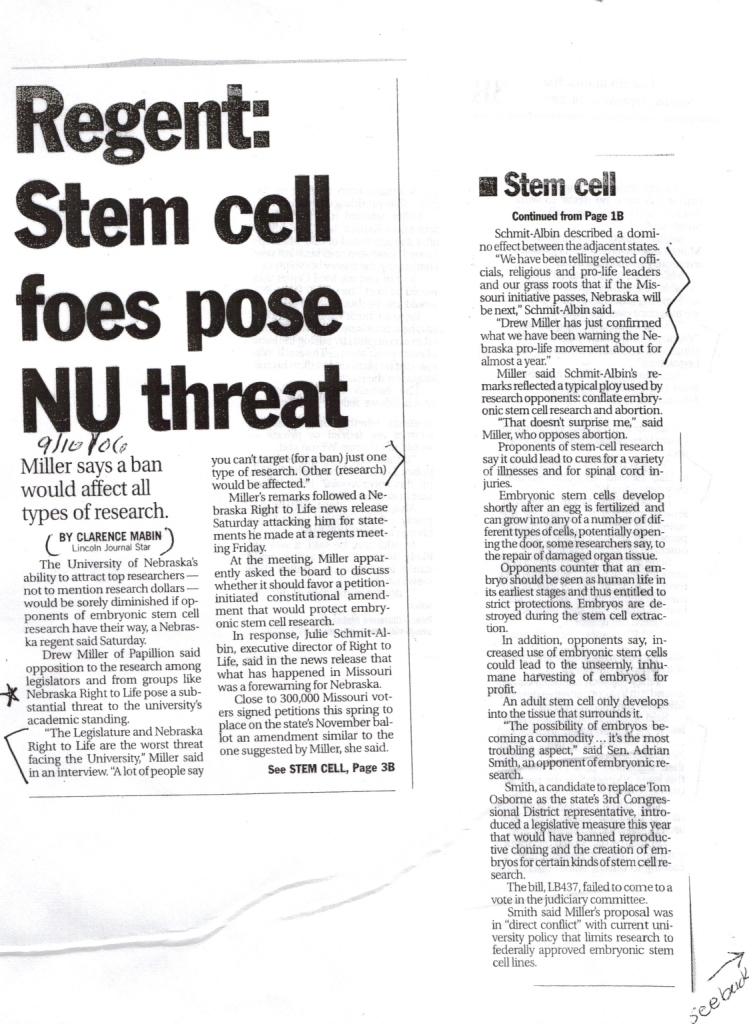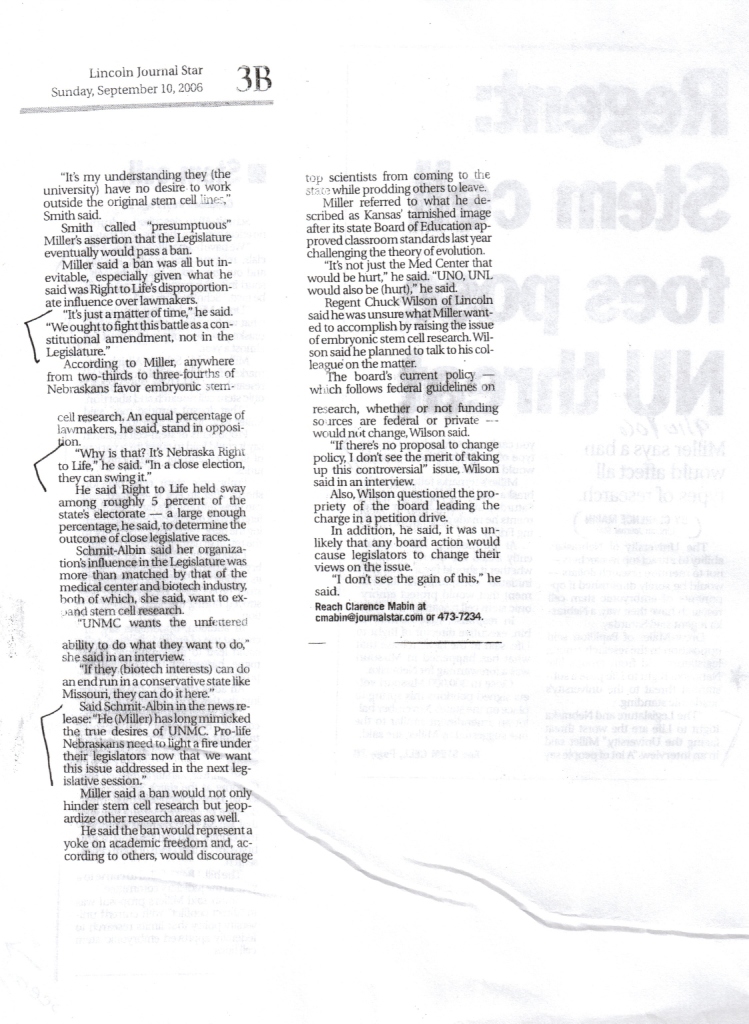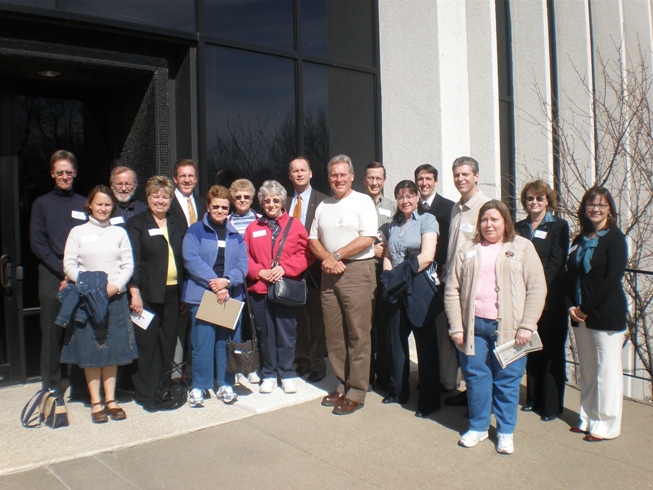5/7/09
TO: NU Board of Regents
RE: Comments in Lincoln Journal Star article, 5/7/09 by
UNMC’s Dr. James Turpen
Dear Regent:
Today’s Lincoln Journal Star has an article entitled, “UNMC to Co-Host First Science Café in Lincoln on May 14.” I have forwarded a copy of the article to you for your perusal. What is most concerning to us are the comments by UNMC’s Dr. James Turpen in discussing the need for the Science Cafes.
His quote: “A public armed with facts and understanding of science is better able to appreciate and apply scientific advances and to vote knowledgeably on ballot issues and initiatives related to science.” said UNMC’s James Turpen, Ph.D., the leader of the science literacy team.
The article also noted that in addition to UNMC, the Science Café programs are hosted by the Nebraska Coalition for Lifesaving Cures (formerly Nebraskans for Research) and Bio Nebraska. (Nebraska Coalition for Lifesaving Cures has an opposite position to the pro-life position on unethical medical research. Bio Nebraska has taken an official policy to leave medical research unfettered.)
In September, 2006, Nebraska Right to Life took issue with comments made by then-NU Regent Drew Miller. An LJS article on 9/10/06 noted that Miller had stated at the September, 2006 Regents meeting that that Board should “discuss whether it should favor a petition-initiated constitutional amendment that would protect embryonic stem cell research.” He is also quoted, “It’s just a matter of time. We ought to fight this battle as a constitutional amendment, not in the Legislature.”
Nebraska Right to Life’s response in that same 9/10/06 LJS article was to note that the current Missouri initiative petition drive was being orchestrated to confuse Missouri voters into thinking they would ban cloning by voting for the initiative when in fact, that ballot measure enshrined cloning for research purposes into the Missouri Constitution. My quote from the article, “UNMC wants the unfettered ability to do what they want to do. If biotech interests can do an end run in a conservative state like Missouri, they can do it here.”
At the time Nebraska Right to Life sent out a mailing citing Miller’s comments and warning that we needed to be vigilant that UNMC could also get around the legislative process by going directly to the people. While pro-lifers are folks who embrace the initiative petition and referendum process available to us in this state, we also know that those who have the most money can frame and influence an initiative debate and ultimately prevail, as happened in Missouri. Many Missourians truly thought they were banning cloning by voting for that initiative when the exact opposite was true. The bio-tech interests in Missouri massively out-spent the pro-life forces and were able to frame the debate to make it most appealing, yet deceptive.
We believe Dr. Turpen’s comments in today’s LJS could mirror the true desire of UNMC. Without voiding the legislative agreement made by both sides with the passage of LB 606 in 2008, UNMC, or more likely it’s mouthpiece, Nebraska Coalition for Lifesaving Cures, could legitimately pursue an initiative petition ballot measure backed by their substantially well-funded private partners and enshrine the same kind of unfettered bio-medical research in Nebraska which has been accomplished in Missouri.
For that reason we believe it is imperative that the NU Regents A: act on a policy regarding bio-medical research and B: inquire of UNMC if it has intentions of fostering a ballot petition drive in 2010 or 2012 to address research issues.
Respectfully,
Julie Schmit-Albin
Executive Director
Nebraska Right to Life
404 S. 11th St., P.O. Box 80410
Lincoln, Ne. 68501-0410
402-438-4802 Office
402-430-8649 Cell
nebraskartl@gmail.com
www.nerighttolife.org


3/6/09
TO: University of Nebraska Board of Regents
FROM: Julie Schmit-Albin, Executive Director
RE: Regents Policy on Biomedical Research
In the 2008 State Legislative session, Nebraska Right to Life, along with our coalition of other pro-life/pro-family lobbying groups, agreed to support the passage of LB 606. LB 606 was termed a compromise from original language in LB 700 which would have enacted a complete ban on privately and publically funded pursuit of unethical medical research. LB 606 ended up banning the public funding of the creation of or destruction of human embryos. Nebraska Right to Life’s understanding of the legislative agreement was that we would not pursue any further state legislation in this area unless it was discovered that private entities were coming into Nebraska to set up privately funded unethical medical research.

Apparently our opponents on this issue (Nebraskans for Research, now Nebraska Coalition for Lifesaving Cures) feel that a legislative agreement extends to the policy of the Board of Regents. Nebraska Right to Life only agreed to limit our activity at the Legislature if and until privately funded unethical research set up shop in Nebraska. We did not agree to abandon other public policy venues which might have an impact in this debate. If the Regents’ policy was off limits then our Political Action Committee would have stopped surveying and endorsing Board of Regents’ candidates. NRL PAC was active in the 2008 Regents races as it has been ever since 2000. If indeed LB 606 had settled the issue for the Board of Regents then we wonder why candidate Earl Scudder for 1st District Regent made the pursuit of unethical medical research a centerpiece of his campaign in 2008. We wonder further why Nebraskans for Research PAC felt compelled to continue supporting candidates such as Mr. Scudder for Regent.
We urge the Board of Regents to hold the line on expanded embryonic stem cell funding if the new Administration decides to go down that path.
Stem Cell Research
Those who support life, including Nebraska Right to Life, encourage and support research in human adult stem cells (including umbilical cord blood stem cells) and their therapeutic application to debilitating and life-threatening diseases and injuries.
This method does not destroy or harm the donor and likely will not experience rejection. It promotes the human life, dignity and well-being of the recipient. This is considered an ethical form of treatment.
Human embryonic stem cell research brings about the direct destruction of human embryos and destroys the human dignity and right to life of embryonic human beings. It is considered unethical research.
Aborted Fetal Tissue Research
David Daleiden of the Center for Medical Progress recently exposed Planned Parenthood’s gruesome work of harvesting and selling aborted baby organs and parts for profit. This helped to bring into question the ethical issues surrounding the gathering of aborted fetal tissue for research.
Nebraska Right to Life supports maintaining the respect of all human embryos as they are human life, even in their earliest stages of development. By using aborted fetal tissue, it tells society these lives are only valuable for their needed parts and organs. Every living human has the right to life and the expectation of human dignity and respect. We would encourage the use of adult stem cell therapies.
Therapeutic Cloning
Cloning involves the production of a human embryonic clone and then the destruction of that clone so that someone struggling with a disease or serious injury can receive treatment. The process fails to respect the inviolable life and dignity of everyone involved: the patient, the patient’s embryonic clone, and the researchers.
Nebraska Right to Life would reject this method of treatment for degenerative diseases as it requires the use of “fresh” embryos, clones of the patient/transplant recipient where their destruction is needed for the treatment to be complete.
